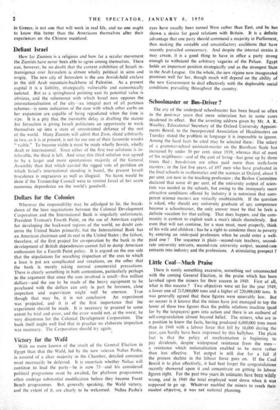Schoolmaster or Bus-Driver ?
The cry of the underpaid schoolmaster has been heard so often in the post-war years that mere reiteration has in some cases deadened its effect. But the arresting address given by Mr. A. R. Woolley, Educational Secretary of the Oxford University Appoint- ments Board, to the Incorporated Association of Headmasters on Tuesday stated the problem in language it is impossible to ignore. Among the hard facts he cited may be selected these: The salary of a grammar-school assistant-master on the Burnham Scale has increased by under 30 per cent. since 1939, whereas that of most of his neighbours—and of the cost of living—has gone up by three times that ; bus-drivers are often paid more than sixth-form masters ; in the last five years, of 897 men who have graduated in the final schools in mathematics and the sciences at Oxford, about 5 per cent. are now in the teaching profession ; the Barlow Committee declared that some 40 per cent. of the university output of scien- tists was needed in the schools, but owing to the immensely more attractive conditions offered by industry it is notorious that com- petent science masters are virtually unobtainable. If the question is asked, why should any university graduate of apy competence become a schoolmaster, the only answer must be that he feels a definite vocation for that calling. That does happen, and the com- munity is content to exploit such a man's ideals shamelessly. But even that will not continue, for a man must, most properly, think of his wife and children ; has he a right to condemn them to poverty by entering an underpaid profession when he could enter a well- paid one ? The sequence is plain—second-rate teachers, second- rate university entrants, second-rate university output, second-rate entrants into industry and the professions. A stimulating prospect ?






































 Previous page
Previous page